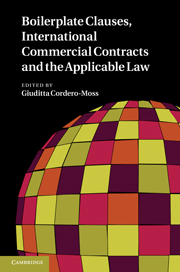Book contents
- Frontmatter
- Contents
- List of contributors
- Preface
- Introduction
- PART 1 How contracts are written in practice
- PART 2 Methodological challenges
- PART 3 The applicable law's effects on boilerplate clauses
- Introduction to Part 3
- 7 The common law tradition: application of boilerplate clauses under English law
- 8 The Germanic tradition: application of boilerplate clauses under German law
- 9 The Romanistic tradition: application of boilerplate clauses under French law
- 10 The Romanistic tradition: application of boilerplate clauses under Italian law
- 11 The Nordic tradition: application of boilerplate clauses under Danish law
- 12 The Nordic tradition: application of boilerplate clauses under Finnish Law
- 13 The Nordic tradition: application of boilerplate clauses under Norwegian law
- 14 The Nordic tradition: application of boilerplate clauses under Swedish law
- 15 The East European tradition: application of boilerplate clauses under Hungarian law
- 16 The East European tradition: application of boilerplate clauses under Russian law
- Conclusion: the self-sufficient contract, uniformly interpreted on the basis of its own terms: an illusion, but not fully useless
- Bibliography
- Index
- References
16 - The East European tradition: application of boilerplate clauses under Russian law
from PART 3 - The applicable law's effects on boilerplate clauses
Published online by Cambridge University Press: 11 April 2011
- Frontmatter
- Contents
- List of contributors
- Preface
- Introduction
- PART 1 How contracts are written in practice
- PART 2 Methodological challenges
- PART 3 The applicable law's effects on boilerplate clauses
- Introduction to Part 3
- 7 The common law tradition: application of boilerplate clauses under English law
- 8 The Germanic tradition: application of boilerplate clauses under German law
- 9 The Romanistic tradition: application of boilerplate clauses under French law
- 10 The Romanistic tradition: application of boilerplate clauses under Italian law
- 11 The Nordic tradition: application of boilerplate clauses under Danish law
- 12 The Nordic tradition: application of boilerplate clauses under Finnish Law
- 13 The Nordic tradition: application of boilerplate clauses under Norwegian law
- 14 The Nordic tradition: application of boilerplate clauses under Swedish law
- 15 The East European tradition: application of boilerplate clauses under Hungarian law
- 16 The East European tradition: application of boilerplate clauses under Russian law
- Conclusion: the self-sufficient contract, uniformly interpreted on the basis of its own terms: an illusion, but not fully useless
- Bibliography
- Index
- References
Summary
Introductory remarks
In line with the general topic of this book, the purpose of the present chapter is to ascertain to what extent different terms of a commercial contract based upon the concepts of Anglo-American law are compatible with Russian law, if the latter is applicable. This chapter focuses mainly on substantive law issues, leaving aside the issues of Russian private international law (PIL).
Naturally, Russian law is influenced to a certain extent by the laws of other countries, Anglo-American law not being an exception. Contracts of finance lease, agency, franchise and entrusted management of property governed by the Civil Code of the Russian Federation (RCC) may be cited as examples. However, Russian legal rules dealing with such contracts are adapted to the continental law system, to which Russia belongs.
Another channel for such an influence is the international conventions in which Russia participates. The most notable example here is the 1980 United Nations (Vienna) Convention on Contracts for the International Sale of Goods (‘CISG’). The impact of Anglo-American legal concepts can be traced in some provisions of the CISG. When the currently-in-force RCC was elaborated in the 1990s, the CISG was taken into account not only with regard to sales contracts, but also when drafting the general provisions of contracts.
- Type
- Chapter
- Information
- Publisher: Cambridge University PressPrint publication year: 2011



